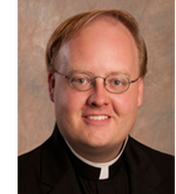|
As we draw our look at the Anointing of the Sick to a close, we want to step back and examine a few things that surround the Anointing of the Sick which are sometimes, but not always, present in its administration and also examine the question of when the best time to be anointed is.
The first aspect that we want to examine is what is called Viaticum – Viaticum, is the administration of the Holy Eucharist for the final time before someone dies or is in danger of death. The name itself is rooted in the Latin with the sense that Christ, present in the Eucharist, journeys with the person as they make the passage through death. There is a short prayer added to the giving of the Eucharist as Viaticum, “May the Lord Jesus Christ protect you and lead you to eternal life.” When we think about it, whether we are heading out on a vacation or simply walking through life there is a joy that comes from having companions and what greater companion could we want or need than Christ Himself walking with us through death? The second aspect we will need to consider is the Apostolic Pardon. The Apostolic Pardon is meant to be given towards the end of life by the priest and there are two options, one of which is “By the power which the Apostolic See has given me, I grant you a full pardon and remission of all your sins, in the name of the Father (+) and of the Son and of the Holy Spirit.” The Apostolic Pardon is not the same as sacramental absolution (for the forgiveness of sins which takes place in the Sacrament of Reconciliation), but instead forgives the temporal punishment due to sin (i.e. a plenary indulgence). In other words, provided we die in the state of grace and yet have not done adequate penance for our past sin, this inadequate penance is forgiven through the Apostolic Pardon, which is a great gift. The final aspect of the Anointing of the Sick to consider is ‘when do I call for a priest?’ For many years the sense was that a priest should be called as near to the moment of death as possible, there is nothing wrong with this, however, it is appropriate to anoint someone in a number of circumstances – such as before a surgery, or due to a declining physical condition which may not necessarily be leading to death, or a chronic illness. While we may think of the Anointing of the Sick as “last rites” that is not necessarily the case and given how quickly one’s health can turn, it would probably be better to not wait until the “final moments.” There is another aspect of that and that is that due to the declining number of priests it is not always possible to get a hold of a priest in the case of an emergency and so if it looks as if someone is in their final illness it would be appropriate to contact a priest as soon as possible so that a time can be arranged for him to come and administer the Sacrament. This can also be helpful so that Viaticum can be administered as well, since it’s not unusual for people in their final days to slip into a coma and are unable to receive the Eucharist. The Anointing of the Sick is a beautiful and powerful sacrament and shows and makes present the love and strength of God in the midst of the terrible reality of sickness. (This article is part of a series of articles on The Sacraments which will appear in the bulletin over the course of this year.) Comments are closed.
|
Fr. PeterArchives
June 2023
Categories |
Join us at MassSaturday at 4pm;
Sunday at 7:30am, 9:00am, 10:30am Daily Masses: Monday-Friday 6:30am Tuesday/Friday 8::00am (school days only) Saturdays 8:00am Sacrament of Reconciliation |
|


 RSS Feed
RSS Feed
